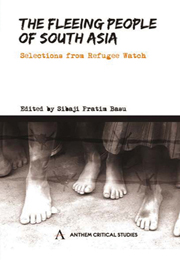Book contents
- Frontmatter
- Contents
- Acronyms and Abbreviations
- Foreword by Ranabir Samaddar
- Preface
- ETHICAL ISSUES
- LAWS
- SOUTH ASIA
- INDIA
- GENDER
- Introduction
- Refugee Repatriation: A Politics of Gender
- Families, Displacement, Partition
- Widows of Brindaban: Memories of Partition
- Agony Continues: Refugee Women of Bhutan
- Dislocating Women and Making the Nation
- Geder, Media and the Tsunami
- Why Should we Listen to Her?
- Women, Trafficking and Statelessness
- The Bar Dancer and the Trafficking Migrant: Globalization and Subaltern Existence
- INTERVIEW/CORRESPONDENCE
- REPRESENTATIONS
- Index
Why Should we Listen to Her?
from GENDER
Published online by Cambridge University Press: 05 March 2012
- Frontmatter
- Contents
- Acronyms and Abbreviations
- Foreword by Ranabir Samaddar
- Preface
- ETHICAL ISSUES
- LAWS
- SOUTH ASIA
- INDIA
- GENDER
- Introduction
- Refugee Repatriation: A Politics of Gender
- Families, Displacement, Partition
- Widows of Brindaban: Memories of Partition
- Agony Continues: Refugee Women of Bhutan
- Dislocating Women and Making the Nation
- Geder, Media and the Tsunami
- Why Should we Listen to Her?
- Women, Trafficking and Statelessness
- The Bar Dancer and the Trafficking Migrant: Globalization and Subaltern Existence
- INTERVIEW/CORRESPONDENCE
- REPRESENTATIONS
- Index
Summary
The refugee situation is one of the burning issues in today's world, where refugees make up more than 1 per cent of the whole population.1 Moreover, a great majority – of over 80 per cent – of refugees are women and their dependent children. The world's refugee situation is thus strongly manifested in and lived through the gendered experiences of women refugees. Yet, even in the face of the telling figures there however exists a striking disparity between the reality of the refugee situation and the business-as-usual of the refugee regime – refugee women's experiences are deemed to fundamental otherness. According to UN High Commissioner for Refugees (UNHCR), ‘(H)istorically, the refugee definition has been interpreted through a framework of male experiences’. […]
Without taking into account refugee women's experiences, it is not possible to understand the refugee situation in a comprehensive and integrated manner. Omitting women's experiences leads to a deficient and incomplete refugee regime and results in inadequate and often even faulty responses to the refugee situation. […]
It is also of importance and interest to elaborate on the argument on a broader plain. It is possible to connect the argument for example to feminist historiography. In this connection, the argument for the importance of moving towards a more complete refugee regime through listening to women's experiences can be strengthened by the notion that ‘a representative history can only be written if the experience and status of one half of humankind is an integral part of the story’.
- Type
- Chapter
- Information
- The Fleeing People of South AsiaSelections from Refugee Watch, pp. 336 - 342Publisher: Anthem PressPrint publication year: 2009



